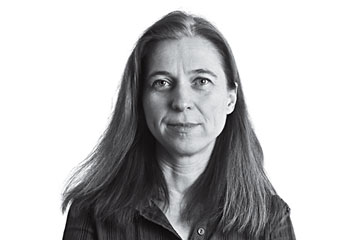
You are the grandniece of Heinrich Himmler, the second most powerful Nazi and one of the biggest war criminals ever. What's it like to live with that?
It was always a very heavy burden in my family. But my father spoke about it very openly from the very beginning. I can't remember the first things we were told about it — we were so young — but I think I was 11 when I watched the movie Holocaust with my parents. That was shocking. I learned what [my great-uncle] was really responsible for. And then I started to read about it.
In the new documentary you're in, Hitler's Children, Bettina Gring, grandniece of Nazi leader Hermann Gring, says she and her brother decided not to have kids, to end the line. Do you feel that way?
Other children of perpetrators in Germany have decided to do that. But for me, that's a continuity of how the Nazis thought — that everything is defined by bloodlines. Genes aren't everything. You can always make your own decisions. For me it was important to get educated, to pass on what I learned.
You still use the name Himmler?
When I was young, I felt I had to get rid of the name as soon as possible. But it was never really a problem from other people. The problem was inside. It wouldn't change anything if I changed my name.
You wrote a book about the Himmler brothers. What did you find out?
It was horrible. Everybody was a member of the party, and almost everybody was a member of the SS. It would have been so great to find one [of that generation] who was, if not in the resistance, at least passive. But I didn't.
Did you know your grandparents?
Only my grandmother. When I was researching my book, I realized she was still in contact with war criminals after '45. It's painful to know that someone you love was sending presents to war criminals.
Did that change the way you felt about her?
Yes, of course. Later she condemned very clearly what happened. But it was a process for her. It was hard. She was married from '33 until '45, during the National Socialist era. Those were her personal best years.
Do you think the shadow of the Holocaust is still over Germany? Or is it beginning to clear?
On the one hand, you have this official dealing with the past. You can get informed about anything, about any detail you want. But on the other side, in the families, there has been this silence over so many years. That started to change only with the third generation, my generation.
What are you telling your son?
He's 13. He doesn't ask very much, but when we speak about it, I realize he knows a lot. I have the impression that for him, it's not that necessary to deal with it, because I have.
You married the Israeli son of a Holocaust survivor. Is that right?
My ex-husband's father was in the Warsaw ghetto as a child, but his family left with false papers and survived in the surroundings of Warsaw until the end of the war.
So your father — Himmler's nephew — and your father-in-law, who once lived in a place where thousands of Jews were shipped to camps every day, were in the same wedding party?
Look, I know the discussion in the U.S. about the Holocaust is much more emotional than in Israel and Germany, but I am a bit frustrated with the suggestion that we are extraordinary freaks. Our fathers are both open-minded and tolerant men. Our parents are still good friends. Both of our families are convinced that it's not helpful to separate the world into good and bad after generations but that it is necessary to speak with the other side.
